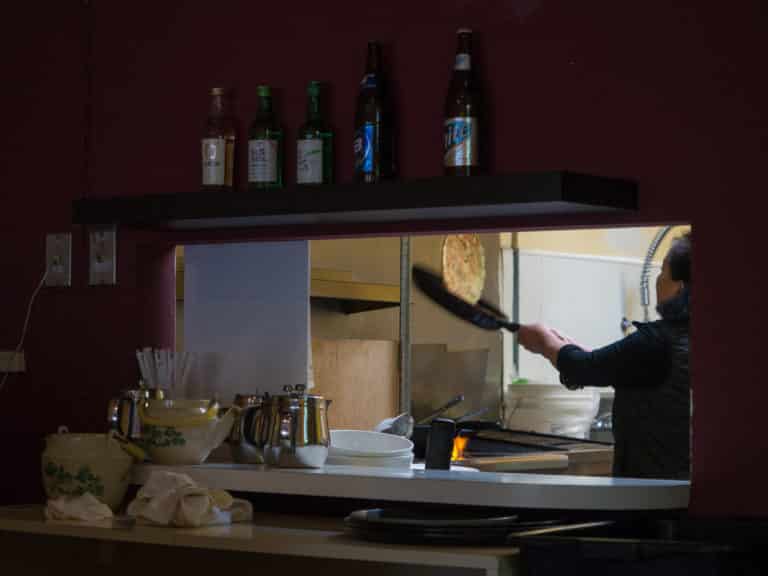
A cook flips a 해물파전 (haemul pajeon, a seafood pancake) from her kitchen. Image by Eugene Kim/Flickr, Some Rights Reserved.
Inheriting the Kingdom of Motherhood and Homemaking
I hide out in the last room I ever thought I would find refuge.
Growing up, I would watch my mother buzz around cutting boards, bowls of chopped up vegetables, and pots and pans on the stove, stopping over each one to stir or smell the contents. Was she a busy bee or more of a mad scientist? Neither does justice to the way she made that space. Frenetic. Dynamic. A little terrifying. I was always in the way. Sometimes I would be asked to chop vegetables, but I did it so poorly I was usually shooed out. Even learning how to make rice in the rice cooker was a delicate art — a seemingly simple task but one that I feel I’ve never gotten quite right until really recently. But I always saw the kitchen as a foreign place, and not my place.
Now, I shoo the kids out, too.
The first time Mom graduated me from cleaning the rice to actually cooking rice meant that I’d grown up a little in her eyes. It was almost a solemn moment when she said she would teach me how to do it. I saw a little sadness in her eyes, maybe because of the passage of time that eluded her in the few years leading up to this point. And a little anxiety, even. But determination, too. After all, every Korean girl should know how to make rice with one hand tied behind her back by the the time she’s ten.
My mother pulled out the clean rice cooker, and then the rinsing container. After measuring cups of uncooked grains and pouring them into the container, dancing all over like the sound of maracas and feet, seeds falling on the ground like rain, she showed me how to rinse it all in the sink until the water poured clear. The water was cold as she filled it up and massaged the grains in methodical handfuls around the perimeter — like she was coaxing out softness and flavor.
My “desk” is right next to the rice cooker, and I love the smell of it steaming into the room, especially in those last few minutes where it seeps into every corner of the house and envelops everything in the feeling of home and comfort: family around the bapsang (bap meaning cooked rice and sang meaning table), my mother chiding me to eat more, my father demanding more rice, my brother covered in it from head to toe, its stickiness the perfect image of Korean jeong. One Korean-English dictionary defines jeong as “feeling, love, sentiment, passion, human nature, sympathy, heart.”

Although it is complicated to identify a clear definition of jeong, it seems to include all of the above, as well as more basic feelings such as attachment, bond, and affection. It’s flesh-and-blood. It’s lives intertwined in explicable ways. It’s stickiness.
“Hanging laundry on a line is a very ordinary task. It is as ordinary as scraped knees and lost keys, as fixing the same simple dish for supper again, and again. Ordinary is most days, and Lord helps us if we overlook them.” —Jerusalem Jackson Greer in A Homemade Year: The Blessings of Cooking, Crafting, and Coming Together
Every time I make rice and let the grains fall through my fingers, I think of the small things that tie me to my family, to my parents, to my children.
And now it’s my turn, this rite of passage. She had me massage some of it as well before pouring out the smoky water carefully so no grains would be wasted. I rolled the rice around in my hand like marbles or pebbles, like sand at the beach. I nervously tried pouring out the water, too, but immediately at least half a cup slid towards the drain.
“Ayyyyy!!” She scolded me before grabbing the container. “Slowly,” she chided me in Korean, tipping it towards the sink so that all the water rushed out but the grains magically sunk to the bottom and stayed in the bowl. “Three to five times should be plenty to rinse the rice.”
Then, instead of taking a measuring cup to pour water into it to cook, she showed me how to use my hand. The directions maybe say about 1½ cups of water for every 1 cup of uncooked rice, but she put her hand in the water, rested it on top of the rice, and filled it up until the water level hit at about the middle of the top of her hand. She put the container back in the cooker, turned the cooker on, and about 20 minutes later, with steam pouring out of the top, it was done. Perfect. Soft and sticky.

The twins are shrieking their demands to each other and to me, fighting over the little plastic hippo, or Anna is fighting Ozzie off as he tries to take her black-and-white-stuffed kitty. I’m taking shelter in the kitchen trying to avoid being found out.
I’m doing any number of things: cleaning, prepping for a meal, snacking, and typing away desperately on a laptop or phone. I see why my mom spent so much time in the kitchen now. It was the final domain where she had some semblance of power. I find the kingdom I’ve inherited to also be fraught with tribal clashes and conflicts that flare up at a moment’s notice, so it makes sense to take cover.
And I think, again, “I’m just a housewife.” My mind turns to a review I read awhile back on a book about the rise and fall of domesticity, and housewifery in American culture during the 19th and 20th centuries, and how it was a high point in prestige for women in respect to women’s work. In fact, it was the golden age of domesticity, where “women had the epic role in which the home provided a touchstone of values for reforming the entire society.” Of course, according to the writer of the article, this is just one revisionist scholar’s opinion.
Still. I’m back to thinking, “What am I doing here?” and “What is my life?” It feels like someone is always whining: this is their dialect, their language, their communication. Why can’t they just talk in normal tones to me? It’s almost always a high screech, filled with tears. The shrillness feels like mosquitoes under my skin, and no amount of DEET or scratching will relieve me of this irritation.
But before I totally spiral down into that all-too-welcoming, familiar despair, they come running into the kitchen and… I stop and release it all with a loud exhalation. I close the laptop, plug in my phone, and place it high on a shelf. I pull out all the pots and pans, big mixing bowls, spoons, and measuring cups, toss barley rice into each one — and my children are squealing, shouting, and down on the floor with me, running their fingers through the rice, scooping and shaping, transferring and spilling, smelling and tasting the dry rice, and I’m laughing.
I’m laughing at the pandemonium, I’m laughing at how mortified my mother would be if she saw me wasting that rice (though I would likely use what didn’t fall on the floor). I’m laughing at how I’m just a housewife, and how the kitchen is my favorite room in the house. I’m laughing at how I’m more than just a housewife, and then, laughing at the joy of my little kingdom.
“There are times when wisdom cannot be found in the chambers of parliament or the halls of academia
but at the unpretentious setting of the kitchen table.” ― E.A. Bucchianeri


Share your reflection